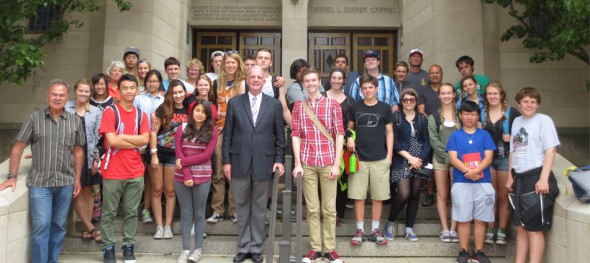The Importance of the Trips at Anacapa School

Upper School students met with Reverend Dr. Robert Allan Hill at Boston University. Dr. Hill addressed his role in the university community following the tragic events at the 2013 Boston Marathon.
Upper School Boston Trip | Lower School Sacramento Trip
There is no doubt that Anacapa trips are some of the most positive long-term memories students take away from their Anacapa years. A comment often heard over the years from our alumni is that they appreciate the fact that they went to places they would never have gone otherwise. As we have maintained the annual scheduling established early on for the Beginning-of-the-Year and End-of-the-Year Trips with many of the same venues, we have also actually developed trips substantially from the early days.
Trips in the first decades of our school history were primarily bonding and experiential in nature, emphasizing the personal-social component of the Anacapa philosophy. For example, the school climbed Half Dome in Yosemite nine different times, and the students certainly learned the importance of teamwork and coordination to meet the challenges involved with that epic hike.
As time has gone by, especially in the last ten years, trips have also become opportunities to engage in technical and critical thinking, the other two components of Anacapa’s philosophy. For example, for the Zion Trip last September, SBCC Professor of Geology Jeff Meyer came to Anacapa beforehand to prep students on the geologic history of the canyons of Zion and Bryce; then on our first morning at Zion, a National Park educational specialist greeted us and briefed the students on the natural history of Zion and Bryce. These preps surely piqued curiosity and added to the experiences of walking up the river in the Narrows, eating and camping with classmates, tracking the stars without the ambient light of cities, and watching the moon rise over the stunning rock formations.
To offer another example of the heightened educational value of current Anacapa trips: before the Lower School took off on our spring trip to Sacramento, the Director of Public Works for the City of Santa Barbara, Rebecca Bjork, gave us a detailed history of Santa Barbara’s water resources and the State Water Project. Her contacts with the Department of Water Resources (DWR) in Sacramento opened doors for the students to meet with a representative from DWR who expounded on the need for and the benefits of the controversial Twin Tunnels project backed by Governor Brown. To balance that perspective, we met with a representative from the Chamber of Commerce, Bill Wells, on location at the Delta. Bill took us on a tour of a Delta levee and explained to the students why he and his group, Restore the Delta, are so adamantly against the Twin Tunnels.
The Upper School left on June 7 for a five-day trip to Boston, as a culmination to our early United States history class this year. Having already examined the Birth of the American Revolution in Boston, students were able to really appreciate their tour of the Freedom Trail led by a re-enactor, as well as their visits to Plymouth Plantation, the homes of the Adams family, Lexington, Concord, Walden Pond, Boston University, Harvard University, and historic Fenway Park, among many other destinations in the Boston area.
Improving our students’ experiences on trips is very important to our faculty, so we make sure we always review in our prep meetings the goals we’ve developed over the years for trips. These include the following:
1. Opportunities for student leadership
2. Personal/social development
3. Faculty bonding with students
4. Expanding students’ geographical horizons
5. Student bonding
6. Learning independent camping and life skills
7. Spending time in nature
8. Personal challenge—pushing limits to accomplish something that students might not have thought they could do
We are convinced that experiential and academic learning really complement each other for an extraordinary and educational memory each time that we complete a trip with these goals guiding our choices. We are sure that you will agree when you see the photos!
